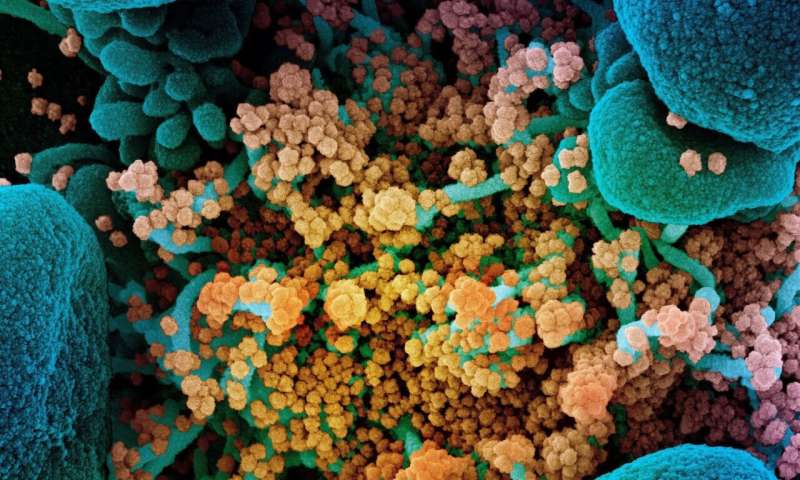
The world hit a new daily record of coronavirus cases due mainly to an explosion of the virus in India, but COVID jabs also approached one billion globally on Saturday, offering hope after months of pandemic misery.
Cases topped 893,000 worldwide on Friday, with more than a third of the infections in India.
Authorities there announced 332,730 new cases on Friday and another 346,786 on Saturday, also a record for a single country since the start of the pandemic, according to an AFP count.
India also reported another 2,624 deaths hours, taking the official toll to nearly 190,000 since the pandemic started.
India has become the new pandemic hotspot—queues of COVID-19 patients and their fearful relatives have built up outside hospitals in major cities—and acute shortages of oxygen have been reported from all over the country.
A surge blamed on a new virus variant and recent “super spreader” public events has wrought devastation on the country of 1.3 billion, with charities forced to set up makeshift funeral pyres in a bid to reduce the strain on crematoriums.
Indian social media and WhatsApp are white-hot with volunteer calls for vacant ICU beds and medicine and the central government is scrambling to organise special trains to get oxygen supplies to worst-hit cities.
One ‘oxygen express’ carrying 30,000 litres of oxygen arrived in Lucknow, Uttar Pradesh state at dawn on Saturday, where armed guards were waiting to escort trucks to hospitals.
The Indian air force is also being used to transport oxygen tankers and other supplies around the country and to bring oxygen equipment from Singapore.
West accelerates rollouts
Kuwait and Iran on Saturday restricted flights and passengers from India until further notice. Canada suspended flights from both India and Pakistan for 30 days, while the US State Department urged Americans to avoid travel to India, even if they are vaccinated.
The grim scenes out of India were in stark contrast to the quickening vaccine rollouts in much of the western world, with US regulators approving the re-start of a rollout of Johnson & Johnson vaccines halted over blood clotting concerns.
The number of jabs is approaching one billion worldwide, according to an AFP count based on official statistics.
Health authorities had proposed a halt following instances of severe blood clots among a handful of the millions of Americans who received the jab—a decision overturned after an expert panel said the shots’ benefits exceeded possible dangers.
In Europe, Belgium said Saturday it would authorise the J&J shot for all adults, having already received 36,000 doses and expecting a total of 1.4 million between April and June.
Meanwhile the country became an outlier in Europe by saying it would use the AstraZeneca vaccine for people aged 41 and over “as soon as possible”, where most have restricted it to older people.
‘Best thing I have done’
“It really is the best thing I’ve ever done,” said 91-year-old British grandmother Margaret Keenan who on December 8 became the first person in the Western world to get an approved coronavirus vaccine.
“I’m telling everyone to go and get it… I hope everyone comes forward,” she said.
Fears over blood clots had also threatened to hamper vaccine roll-out efforts in Europe, where medical regulators said the benefits of AstraZeneca’s COVID-19 vaccine increase with age and still outweigh the risks for adults despite links to very rare side effects.
The news came as the European Union also said it would have enough vaccines to immunise 70 percent of its adult population by the end of July.
EU chief Ursula von der Leyen had previously set a goal of late September for the target, but announced the new date during a visit to a Belgian vaccine plant that is ramping up production of the Pfizer/BioNTech jab.
But despite the optimism the threat of the virus remains ever-present, with Germany set for a tough new lockdown Saturday, including night curfews and school closures, after the government passed a disputed new law designed to slow infections.
The controversial new rules—passed this week amid huge protests in Berlin—will apply in all regions with incidence rates of more than 100 new infections per 100,000 people over the last seven days.
Mounting cases have also forced Japan to issue a state of emergency in some areas just three months before the Olympics are due to open.
The country’s minister for virus response, Yasutoshi Nishimura, has warned of a “strong sense of crisis,” saying current restrictions were not sufficient.
Thai premier Prayut Chan-O-Cha said Saturday that more than 1,400 COVID-19 patients are waiting to be admitted into hospitals, as the kingdom grapples with a spiralling caseload.
“If the outbreak becomes more severe, [the government] may consider reducing hospital quarantine for asymptomatic people from 14 days to 10 days,” he said in a move intended to free up hospital beds.

